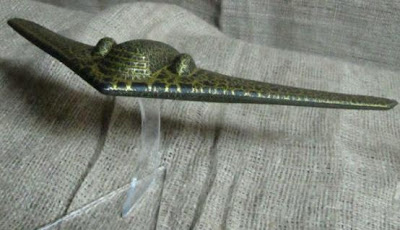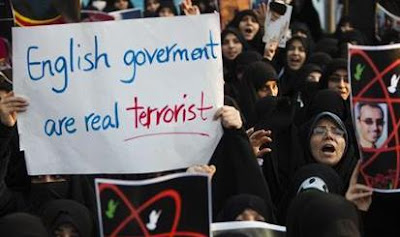 |
| Iranian Oil minister Rostam Qasemi talks to journalist |
(Reuters) - Iran ordered a halt to its oil sales to Britain and France on Sunday in a move seen as retaliation against tightening EU sanctions, as a team of U.N. inspectors flew to Tehran to press the Islamic Republic over its disputed nuclear program.
The European Union enraged Tehran last month when it decided to impose a boycott on its oil from July 1. Iran, the world's fifth-largest oil exporter, responded by threatening to close the Strait of Hormuz, the main Gulf oil shipping lane.
On Sunday, its oil ministry went a step further, announcing Iran has now stopped selling oil to France and Britain altogether - a powerful yet largely symbolic message since neither European nation relies on Iranian crude imports.
"Exporting crude to British and French companies has been stopped ... we will sell our oil to new customers," spokesman Alireza Nikzad was quoted as saying on the ministry website.
Iran, which denies Western allegations that it is seeking to make nuclear weapons, has ramped up its rhetoric in recent weeks while also expressing willingness to resume negotiations on its nuclear program.
A five-member team from the U.N. International Atomic Energy Agency (IAEA) flew to Tehran late on Sunday for talks, although Western diplomats have played down any hopes of a major breakthrough in the two-day meeting.
"I'm still pessimistic that Iran will demonstrate the substantive cooperation necessary," one envoy said in Vienna.
Yet the outcome of this week's discussions is important and will be watched closely because it could either intensify the standoff or offer scope to reduce tensions.
The European Commission says the bloc would not be short of oil if Iran stopped crude exports as it has enough stock to meet its needs for around 120 days.
Industry sources said European oil buyers were already making big cuts in purchases from Iran months in advance of EU sanctions. France's Total has stopped buying Iranian oil while debt-ridden Greece is most exposed to Iranian crude disruption among European countries.
MILITARY STRIKE?
Iran says its nuclear program is entirely peaceful but its refusal to curb uranium enrichment, which can have both military and civilian purposes, has raised concerns.
Western powers have not ruled out using force against Iran, and there has been an intense public discussion in Israel about whether it should attack Iran to stop it making a nuclear bomb.
However, on Sunday the top U.S. military officer said a military strike would be premature as it was not clear that Tehran would use its nuclear capabilities to build an atomic bomb.
"I believe it is unclear (that Iran would assemble a bomb) and on that basis, I think it would be premature to exclusively decide that the time for a military option was upon us," said General Martin Dempsey, chairman of the U.S. military's Joint Chiefs of Staff.
He said he believed the Iranian government was a "rational actor."
The West has expressed some optimism over the prospect of new talks with Tehran, particularly after it sent a letter to EU foreign policy chief Catherine Ashton last week promising to bring "new initiatives" to the table.
"In these negotiations, we are looking for a way out of Iran's current nuclear issue so that both sides win," Iranian TV quoted Foreign Minister Ali Akbar Salehi as saying on Sunday.
Oil is a major part of Iran's export revenues and an important lifeline for its increasingly isolated economy. It has little refining capacity and has to import about 40 percent of its gasoline needs for domestic consumption.
Tightening sanctions, combined with high inflation, have squeezed the ability of working-class Iranians to feed themselves and their families, and this uncertainty forms the backdrop to a parliamentary vote on March 2.
"Everything's become so expensive in the past few weeks," said Marjan Hamidi, an Iranian shopper in Tehran, "But my husband's income stays the same. How am I going to live like this?"
The European Union enraged Tehran last month when it decided to impose a boycott on its oil from July 1. Iran, the world's fifth-largest oil exporter, responded by threatening to close the Strait of Hormuz, the main Gulf oil shipping lane.
On Sunday, its oil ministry went a step further, announcing Iran has now stopped selling oil to France and Britain altogether - a powerful yet largely symbolic message since neither European nation relies on Iranian crude imports.
"Exporting crude to British and French companies has been stopped ... we will sell our oil to new customers," spokesman Alireza Nikzad was quoted as saying on the ministry website.
Iran, which denies Western allegations that it is seeking to make nuclear weapons, has ramped up its rhetoric in recent weeks while also expressing willingness to resume negotiations on its nuclear program.
A five-member team from the U.N. International Atomic Energy Agency (IAEA) flew to Tehran late on Sunday for talks, although Western diplomats have played down any hopes of a major breakthrough in the two-day meeting.
"I'm still pessimistic that Iran will demonstrate the substantive cooperation necessary," one envoy said in Vienna.
Yet the outcome of this week's discussions is important and will be watched closely because it could either intensify the standoff or offer scope to reduce tensions.
The European Commission says the bloc would not be short of oil if Iran stopped crude exports as it has enough stock to meet its needs for around 120 days.
Industry sources said European oil buyers were already making big cuts in purchases from Iran months in advance of EU sanctions. France's Total has stopped buying Iranian oil while debt-ridden Greece is most exposed to Iranian crude disruption among European countries.
MILITARY STRIKE?
Iran says its nuclear program is entirely peaceful but its refusal to curb uranium enrichment, which can have both military and civilian purposes, has raised concerns.
Western powers have not ruled out using force against Iran, and there has been an intense public discussion in Israel about whether it should attack Iran to stop it making a nuclear bomb.
However, on Sunday the top U.S. military officer said a military strike would be premature as it was not clear that Tehran would use its nuclear capabilities to build an atomic bomb.
"I believe it is unclear (that Iran would assemble a bomb) and on that basis, I think it would be premature to exclusively decide that the time for a military option was upon us," said General Martin Dempsey, chairman of the U.S. military's Joint Chiefs of Staff.
He said he believed the Iranian government was a "rational actor."
The West has expressed some optimism over the prospect of new talks with Tehran, particularly after it sent a letter to EU foreign policy chief Catherine Ashton last week promising to bring "new initiatives" to the table.
"In these negotiations, we are looking for a way out of Iran's current nuclear issue so that both sides win," Iranian TV quoted Foreign Minister Ali Akbar Salehi as saying on Sunday.
Oil is a major part of Iran's export revenues and an important lifeline for its increasingly isolated economy. It has little refining capacity and has to import about 40 percent of its gasoline needs for domestic consumption.
Tightening sanctions, combined with high inflation, have squeezed the ability of working-class Iranians to feed themselves and their families, and this uncertainty forms the backdrop to a parliamentary vote on March 2.
"Everything's become so expensive in the past few weeks," said Marjan Hamidi, an Iranian shopper in Tehran, "But my husband's income stays the same. How am I going to live like this?"







